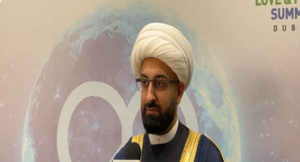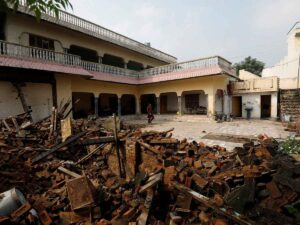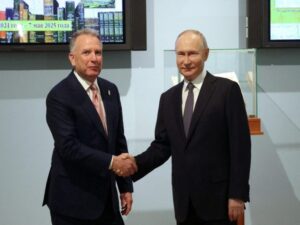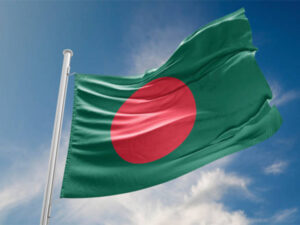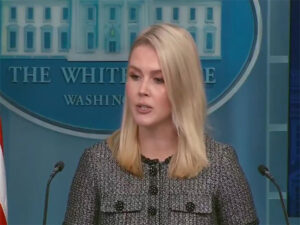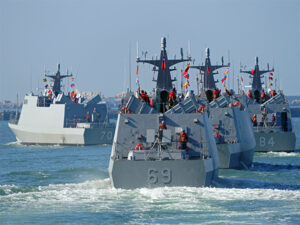Is US listening to Bangladesh message against China: Report
Dhaka [Bangladesh], July 4 (ANI): Over the past few years, the US has been seen to be ignoring Bangladesh’s message that China is trying to pressurise Dhaka to get involved in the Belt and Road Initiative, Bangladeshlivenews reported.
According to the publication, a couple of years ago, China had warned Bangladesh from joining the Indo-Pacific initiatives, which was launched by the US, but under Prime Minister Sheikh Hasina, the government firmly told Beijing that they would follow their own foreign policy.
Despite being the regional player in South Asia, Bangladesh has received a cold shoulder from the US, which gives lectures on human rights and democracy and pressurises the government on “free and fair” elections.
Bangladeshlivenews suggest that the policymakers in the Biden administration must re-think their strategy of pushing Bangladesh on human rights and using various methods like sanctions to get Sheikh Hasina to hold “free and fair” elections scheduled to be conducted early next year.
Even, Indian interlocutors have from time to time told their US and other Western counterparts of the relevance of Bangladesh in South Asia.
The Biden administration has lately been regularly inviting leaders of several nations as part of the Indo-Pacific strategy to counter China’s clout.
Ironically, it was Prime Minister Modi who is said to have convinced the Donald Trump administration to “recognise and accept” Bangladesh’s 2018 election results. PM Modi at the time, assured the US that Sheikh Hasina’s government would be stable and work towards American strategic and economic interests in the region and that Dhaka would “keep China at bay and continue playing the fine balancing game”.
Under Sheikh Hasina, the country of 170 million people has been transformed. The country averaged an annual growth rate of 7 per cent in the decade before the coronavirus pandemic. The World Bank has described Bangladesh as a “remarkable story of poverty reduction and development”, with poverty declining from 41.9 per cent in 1991 to 13.5 per cent in 2016 based on the international poverty line of USD 2.15 a day.
After decades of being one of the world’s least developed countries, Bangladesh is expected to become a developing country by 2026. Last year, however, the Hasina government sought aid from the International Monetary Fund (IMF) to boost Bangladesh’s economy following a slump in foreign reserves, economic disruptions amid the conflict in Ukraine and macroeconomic risks posed by climate change. In January, the IMF agreed to a USD 4.7 billion loan, reported Bangladeshlivenews.
In 2020, then-US Deputy Secretary of State, Stephen Biegun had called Bangladesh a “key partner” in the Indo-Pacific and “a centre-piece of our work in the region”, adding that the US was committed to growing the “partnership”. He invited Bangladesh to take part in the Indo-Pacific Business Forum, which aims to advance trade, investment and economic cooperation between the US and Indo-Pacific nations.
In December 2021, the US Treasury Department sanctioned seven leaders of an elite Bangladeshi paramilitary unit accused of carrying out forced disappearances and extrajudicial killings of political opponents. The move followed a warning in February from Derek Chollet, US State Department Counsellor, that the erosion of democracy in Bangladesh would limit Washington’s ability to cooperate with Dhaka.
He urged Hasina to ensure free and fair elections. More recently, US Secretary of State Antony Blinken threatened to deny American visas to anyone trying to hinder free and fair democratic elections in Bangladesh.
In response, Dhaka said it would “like to view the announcement in a broader context of its government’s unequivocal commitment to holding free and fair elections at all levels”. The US obviously did not accept Sheikh Hasina’s assertions that conditions in Bangladesh are favourable for such elections.
Pertinently, the US was among the first countries to recognise Bangladesh as an independent nation in 1971, and it is one of Dhaka’s largest trading partners, reported Bangladeshlivenews.
In April 2023, Dhaka issued its first official policy on the Indo-Pacific, calling for the establishment of “rules-based multilateral systems” to promote “equitable and sustainable development”. This attempt at equipoise may have contributed to Dhaka’s deteriorating ties with the Biden administration.
However, the nub of the matter relates to the US administration’s perspective on the conduct of free and fair elections in Bangladesh. Recent US-Bangladesh tensions have unfortunately given China the opportunity to step into the vacuum.
Seeing the gap in the US-Bangladesh relationship, China sees an opportunity and wanted to use this moment to take Dhaka on its side. Bangladesh’s top trading partner, as well as its largest foreign direct investor and military supplier, encompassing aircraft, tankers, fighter jets and submarines, is China.
In the last six months, senior Chinese officials have visited Dhaka, including a surprise midnight stop by Chinese Foreign Minister Qin Gang right before US Assistant Secretary of State Donald Lu’s visit in January. Chinese vice-foreign Minister Sun Weidong travelled to Dhaka in May 2023, as per Bangladeshlivenews.
It is, therefore, imperative for the West to re-look at Bangladesh and focus on building ties with a view to preventing Chinese ingress and not merely work towards pressurizing the Sheikh Hasina government on “free and fair” elections.

